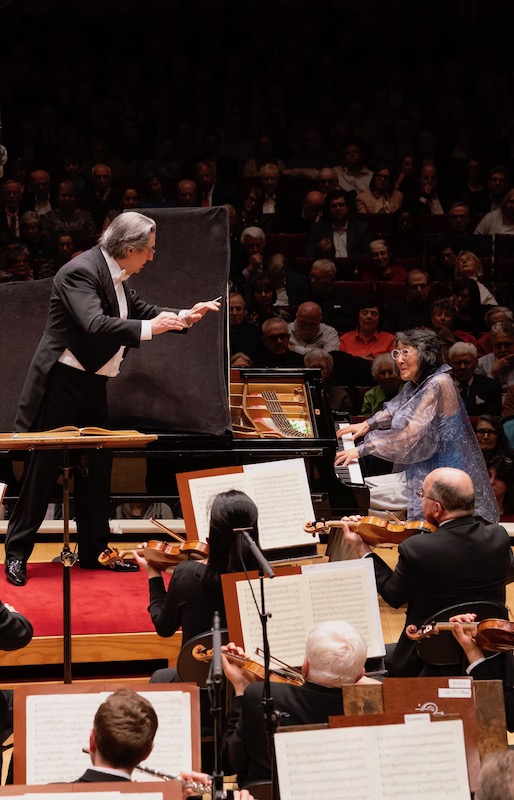Muti leads CSO in an evening of populist Mozart and Stravinsky

Following the seven-week void of the musicians’ strike, for the second week of the recommenced Chicago Symphony Orchestra season, Riccardo Muti led a populist program of Mozart and Stravinsky Thursday night, one reflective of his nine Chicago seasons.
If there were no surprises in either the repertoire or the performances, there were few disappointments either, with the orchestra playing at its usual high level when their Italian music director is on the podium.
The one work this week new to Muti’s local repertoire, was, oddly enough, the Overture to Mozart’s Le nozze di Figaro, which opened the evening. Amazingly, this most inescapable of opera overtures hasn’t been played at a CSO subscription concert in 18 years.
Muti led a fleet yet vivacious reading of Mozart’s curtain-raiser, with a palpable theatrical sense of anticipation for the operatic comedy to follow. Even in these familiar four minutes of music, Muti characteristically managed to bring forward wind lines usually covered, not least the galumphing bassoon.
There is no more beloved visitor to Symphony Center than Mitsuko Uchida. The pianist has built up a strong bond of audience affection with her many seasons of winter concerts, leading Mozart concertos from the keyboard.
Uchida clearly remains an estimable Mozartean. Yet in her performance of the Piano Concerto No. 20 in D minor, it was hard to avoid the feeling of the inexorable march of time. There were a couple digital slips and her passagework felt fitfully stiff and emphatic when it formerly went like the wind. At a deliberate tempo, the Rondo didn’t quite deliver the optimistic burst of bright virtuosity needed to ideally close this dark-hued work.
Still, Uchida is such a profound and insightful musician that there were still pleasures to be had in her traversal of K. 466. Following Muti’s nuanced yet dramatic introduction, the pianist conveyed the restless sturm und drang of the opening movement, lightening her tone for the lyrical contrasts, and making a distinctive miniature tone poem out of the cadenza.
As always with this artist, the slow movement was a highlight, her simple eloquence and poised phrasing of the Romanza echoed by the gracious woodwinds. If not the last word in bravura, Uchida’s playing provided a strong finale, aided by Muti’s alert, equally forceful accompaniment. An enthusiastic ovation and repeated curtain calls followed, with Muti looking bemused by his soloist’s low bows and charming-awkward acknowledgement of the applause.
From Mozart to two ballet scores by Stravinsky on the second half. But not quite those originally scheduled.
Unfortunately, Stravinsky’s complete ballet of Apollon musagète (or Apollo) was jettisoned for the shorter and lighter Divertimento extracted from The Fairy’s Kiss. No official explanation was given for the change.
Stravinsky’s ballet refashions some less-than-essential Tchaikovsky into his own bustling sound world. Most of the originals are nearly unrecognizable in this suite, retooled into Stravinsky inimitable, wind-driven voice.
Muti brought customary rhythmic tautness and scrupulous balancing to Stravinsky’s confection, with a nice jaunty bounce to the horns’ march-like theme in the opening Sinfonia. Still, the clear-eyed approach shorted Stravinsky’s quirky humor and satiric edge at times, though guest horn David Cooper, from the Dallas Symphony, brought a wry Terpsichorean touch to his nimble solo.
The concluding section went with more personality, with flutist Stefán Ragnar Höskuldsson at his finest, and cellist John Sharp and clarinetist John Bruce Yeh graceful partners in the Pas de deux. Spirited antic energy propelled the final section.
The concert concluded with the not-unfamiliar 1919 Suite from The Firebird. Muti’s unsentimental style and whipcrack direction diluted some of the score’s tenderness and charm, though there were some offbeat interpretive touches in the balance. The thunderous opening chord of Kashchei’s Infernal Dance had a few audience members jumping and Muti’s steady tempo made that malign music more nerve-wracking than the usual fast-and-brilliant approach.
The individual contributions proved striking, especially Keith Buncke’s stately bassoon solo in a rather cool Bercuese. Guest horn Cooper lifted an atmospheric solo in the closing section, the lovely theme rising magically as if out of the distance.
The playing of guest trumpet Hunter Eberly, from the Detroit Symphony, and guest tuba Fritz Kaenzig, from the Grant Park Orchestra, was equally polished and assured.
The program will be repeated 8 p.m. Friday and Saturday. cso.org; 312-294-3000.
Posted in Performances




